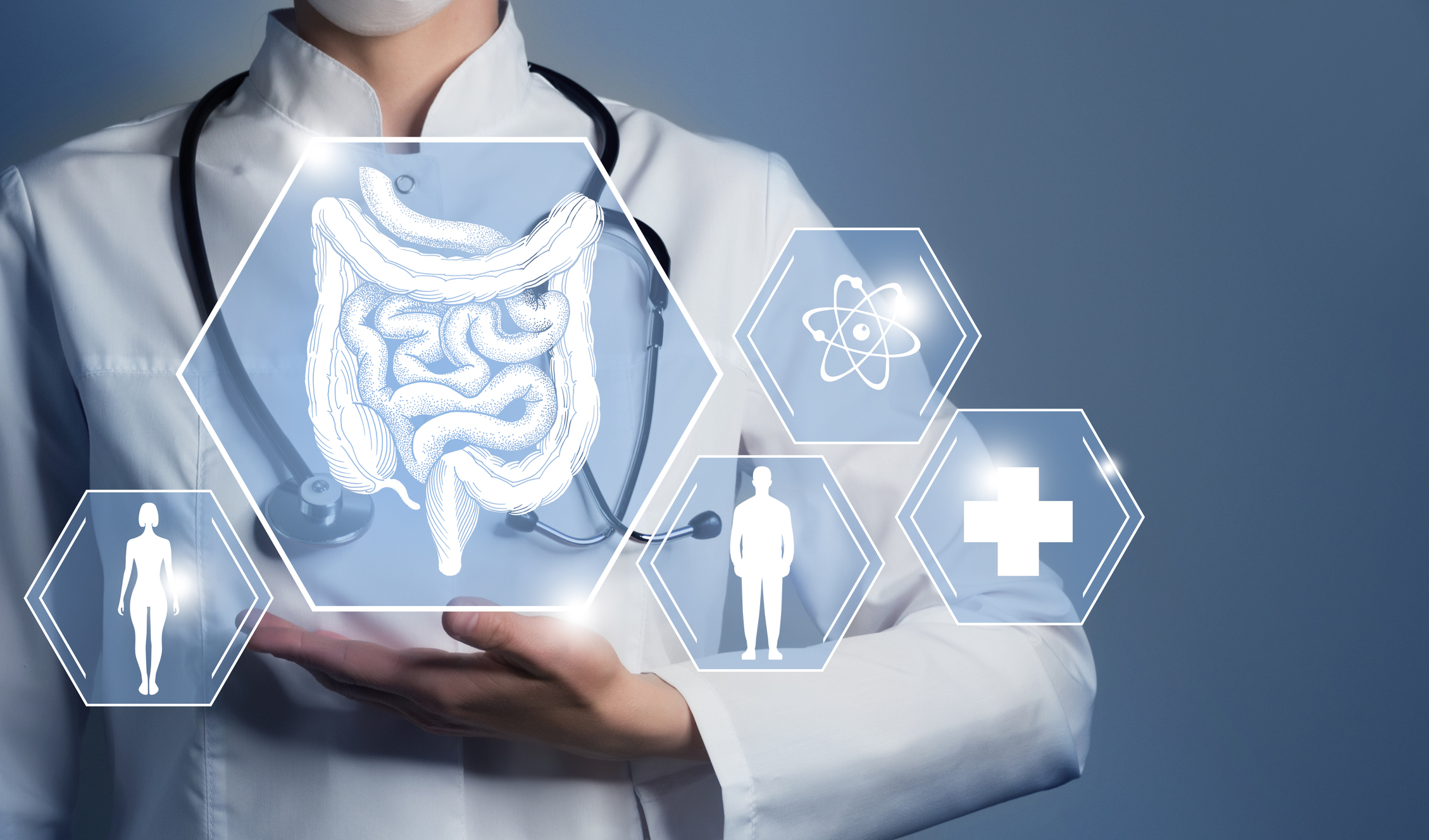
Areas of application / Digestion & liver
Digestion & Liver
The digestive tract and the liver are essential components of the human digestive system and play a crucial role in the absorption, processing and utilization of food.
The digestive tract, also known as the gastrointestinal tract, begins in the mouth with the mechanical grinding of food by chewing and the enzymatic breakdown by saliva.
The food then passes into the pharynx and from there into the oesophagus, where peristalsis ensures that it is transported into the stomach.
In the stomach, chemical and mechanical digestion takes place through the use of gastric acid and digestive enzymes.
The chyme, the digested food, then passes through the pylorus and enters the duodenum, where the gallbladder releases bile and the pancreas produces digestive enzymes.
Here, fats, proteins and carbohydrates are broken down further.

The main part of food breakdown and digestion takes place in the small intestine, more precisely in the jejunum and ileum.
This is where the absorption of nutrients takes place, which are then transported to the liver via the portal vein.
The liver is a vital organ with numerous metabolic functions.
It produces bile, which is used to emulsify fats, and it stores nutrients such as glycogen, vitamins and minerals.
The liver also detoxifies the body by breaking down harmful substances.
Considering the essential metabolic processes within our bodies, the conscious intake of healthy cellular components could help to promote the long-term health of the digestive and liver systems.
Diseases and symptoms
-
Gastroesophageal reflux disease (GERD): A chronic condition in which the acidic contents of the stomach flow back into the esophagus, causing heartburn and inflammation.
-
Irritable bowel syndrome (IBS): A functional bowel disorder that can cause abdominal pain, bloating, diarrhea and constipation.
-
Ulcerative colitis: An inflammatory bowel disease that causes inflammation and ulcers in the large intestine and leads to symptoms such as diarrhea and abdominal pain.
-
Crohn’s disease: Another inflammatory bowel disease that can affect the entire digestive tract and leads to inflammation, ulcers and digestive disorders.
-
Leaky gut syndrome: A disturbed intestinal barrier can lead to increased intestinal permeability and possibly trigger inflammation and immune reactions in the body.
-
Liver diseases: These include fatty liver and liver cirrhosis, which impair liver function and can be life-threatening in the worst cases.
-
Stomach ulcers: Painful ulcers in the mucous membrane of the stomach or small intestine, often caused by Helicobacter pylori infections or non-steroidal anti-inflammatory drugs and painkillers.
Chronic stress and an unhealthy diet can also lead to a stomach ulcer. -
Pancreatitis: An inflammation of the pancreas that leads to digestive problems and abdominal pain.
-
Food intolerances and allergies: Reactions to certain foods that can cause digestive problems, allergies and intolerances.
Care and maintenance of health
-
Healthy diet: A balanced diet rich in fiber, fruit, vegetables and lean protein aids digestion and protects the liver.
Reduce your intake of saturated fats and sugary foods. -
Limit alcohol consumption: Excessive alcohol consumption can cause liver disease.
The recommendation is to drink alcohol in moderation or avoid it altogether, depending on individual tolerance. -
Quitting smoking: Smoking can increase the risk of gastrointestinal cancer.
Quitting smoking is therefore an important protective factor. -
Weight control: Being overweight increases the risk of fatty liver disease and diseases of the digestive tract.
Healthy weight control is therefore advisable. -
Regular exercise: Physical activity promotes gut health and contributes to overall health.
It can prevent digestive problems and contribute to weight control. -
Hygiene: Following good hygiene practices, especially when handling food, can prevent infections and food poisoning.
-
Screening examinations: Regular check-ups, especially in the case of risk factors or a family history, are crucial for identifying and treating potential problems at an early stage.
The following content is only visible to specialists. Register now.


